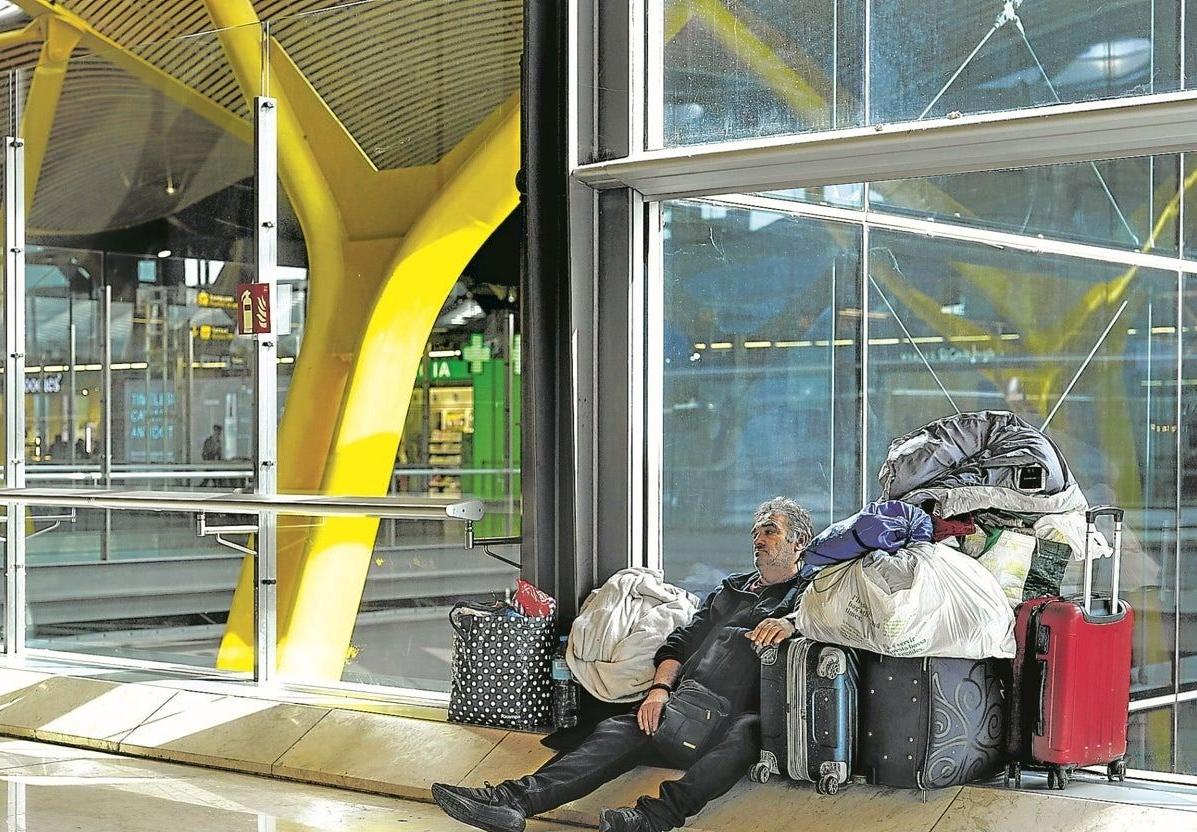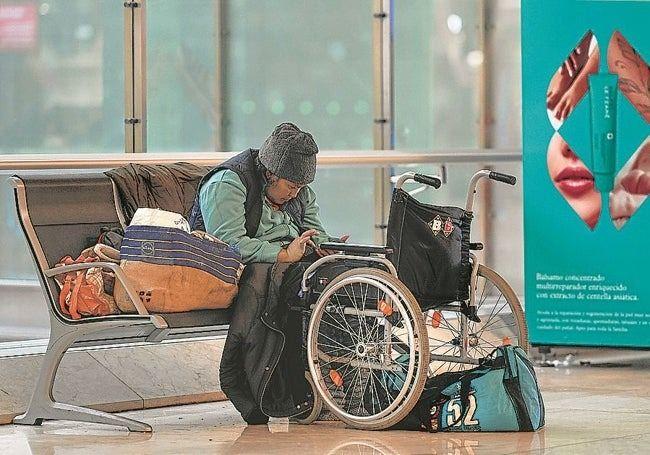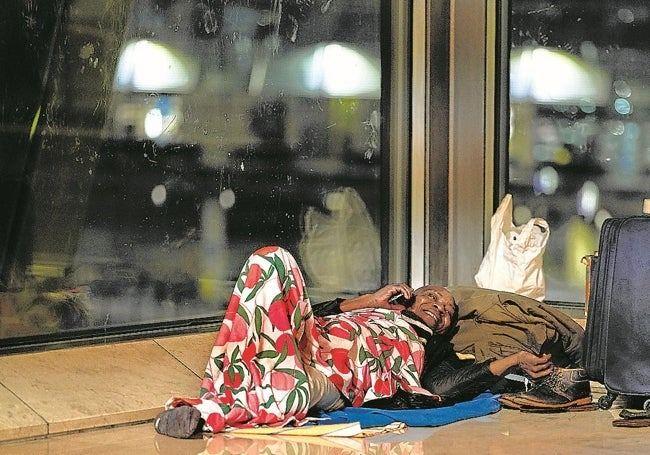

Sections
Highlight

It is ten o'clock at night on a Tuesday in March. It's raining outside T4 and the thermometer reads 6C. It's cold in Madrid. Or at least unpleasantly cold for sleeping outdoors. At the same time, inside the terminal, in a corridor in the transit and check-in area, Fernando and Aurora, a married couple aged 69 and 63, spread a couple of blankets on the floor and unroll their sleeping bags. It's time to get ready to spend another night- and they've already passed more than a thousand - under the roof of Barajas airport. "It's warm here, there are public toilets to wash up and you have the metro to go to Madrid. Man, I'd prefer to have my own room, but with 500 euros for my pension I can't afford it", says Fernando, a Cuban with Spanish nationality, while Aurora, his Romanian wife, nods resignedly.
The couple have been waiting for three years to be assigned a flat, and since then they have been sleeping in the terminals of Barajas (now in T4, but they have passed through the other three), converted into an improvised home for "between 300 and 500 'homeless'", according to figures provided by Alternativa Sindical Aena/Enaire (ASAE), an independent union (the majority among the 1,100 Aena employees at Barajas) has denounced "the growing problem of homelessness" at the Madrid airport, making headlines and opening Pandora's box by presenting a third-world image of Spain's leading airport and Europe's fifth busiest.
Fernando and Aurora are two of the 'homeless' stranded in T4, where alongside the glamour of travellers bound for Paris, London or New York coexists the harsh reality of men and women who are not on any passenger list or waiting for any flight to depart. Like David, 52, a native of nearby Guadalajara, who was ruined by a painful divorce and who for the last year has been living in T4 tied to a suitcase in which he keeps his meagre belongings and from which he does not part "because two mobile phones have already been stolen here". Or like Ángel, a 56-year-old from Madrid who looks 20 years older and who blames his current situation on drink. "I was a waiter, I lost my job because of alcohol, I stopped paying the rent, they evicted me and here I am trying not to drink again, but it's hard", he sums up a life that fits into two plastic bags from Mercadona. In one, two threadbare blankets stick out and in the bottom of the other he keeps a packet of crisps and a chocolate milkshake that he has just been offered by two 'real' and supportive travellers.
Among the indifference of the thousands of passengers coming and going through the corridors of T4, there are a handful who stop in front of a human landscape that we can imagine under a bridge, but which breaks with the idyllic image of expensive perfumes and duty free at an international airport.
Although they are gestures counted on the fingers of one hand, there are tourists who offer their help to people like Ángel. Or like Nelly, a 67-year-old Peruvian who uses a crutch to help her because of osteoarthritis in her hip, and who bursts into tears when she tells of the circumstances that have forced her to live, for eight months now, in the main terminal at Barajas. "I was an intern and looked after an old man in Madrid, but he died and I was left without a job. What I had saved I spent on my mother's funeral in Lima. And now I'm just waiting for my retirement pension to be recognised so I can get out of here. Do you think that at my age I want to sleep rough in an airport?
Like many other homeless people who spend the night in T4, Nelly takes the metro every day to the Casa de Baños to take a shower and to the Cáritas soup kitchen to fill her stomach. Then she returns to her home-the terminal, where dinner depends on an NGO that occasionally passes through T4 or a charitable traveller. She often tries her luck with McDonald's. "I know it's forbidden, but I go and talk to them, I tell them my situation and some of them understand me and invite me for a bite to eat". The day ends for Nelly on an aluminium bench near the check-in counters. She lies down, curls up in a ball and dreams of her longed-for retirement pension.

In another of those seats, Liset, a 42-year-old Nicaraguan in a wheelchair, is looking for a comfortable position that will allow her to take a nap. This is her second night in Barajas. "I was in a municipal hostel, but there are many people there with mental health problems, with addictions, people who shout at dawn and fight... you don't live there, you survive, and I didn't feel safe at all. A lady from Colombia told me about the airport, and between sleeping in the street dying of cold or in a hostel full of crazy people, I'm better off here. There is surveillance and it's warm," she explains.
Eviction and Closure : They propose evicting the homeless, closing airports at night, and allowing access only to those who are traveling.
Security : They call for a greater deployment of the National Police and UIP (Intervention Units) as well as the return of the Municipal Police.
Social Assistance: They urge Madrid city council, AENA, and the Government Delegation to come together and set up tents and prefabricated modules, as has been done in past social and refugee crises, "where these people can stay in dignified conditions."
No more than a hundred metres from Liset, sitting on another of those benches of 'hostile architecture' designed to torture whoever lies down, 67-year-old Venezuelan Marta feeds her son Luis Alberto, an autistic young man of 36, for whom she came to Spain in search of specialised care. "I arrived in Madrid a month ago, but I've been pushed around and I can't take it any more, I've decided to go back to Caracas". His return ticket is due on 17 March, and until then mother and son are sheltering at the airfield. "We put some cardboard on the floor and then throw some blankets on top of it. It's uncomfortable, but in Venezuela, things aren't any better". The Latinos who spend the night in T4 have taken a liking to Luis Alberto and bring him the odd hamburger, which the young man thanks with a cheerful gesture. Many of them are emigrants with jobs in Madrid, most of them in construction or "whatever comes up", and they return at nightfall to sleep and save the 200 or 300 euros they are asked for a room in Vallecas.
Among those who have made Barajas their home there are so many different profiles that make the problem a complex issue to tackle. Aena, the manager of the airport facility, and the social services of Madrid city council, in charge of the homeless, have held meetings this week to try to put a stop to homelessness in Barajas, a phenomenon that in the last year "has grown exponentially, producing a devastating effect," says Antonio Llarena, secretary general of ASAE, for whom the airport has become "the largest free hostal in Europe".
In this amalgam of people at risk of social exclusion or directly excluded from the system, there are workers, people who have divorced and lost everything, or people who, due to life circumstances or bad luck, have been left in ruin, without a home or a job. "But they don't do any harm, they go unnoticed, they are usually just passing through or trying to get out of a rut. They are the ones who cause the least problems," says Llarena, who emphasises the 'others', the homeless with mental health disorders and the conflictive, not to say aggressive, types addicted to alcohol or heroin, who get into fights at night, terrorise the workers, and cause safety, health and hygiene problems.
To try to contain the situation, AENA has relocated the 'homeless' in two wings of T4, the north, a "quieter" area, as defined by the security guards, and the south, "more like the Bronx", where 'normal' residents coexist (and not always peacefully) "with others who are more dangerous". It is there that the cleaning staff encounter "insults and threats" every time they go to do their work at half past four in the morning. That is the time when they start cleaning the two wings of the terminal. They are accompanied by security guards, who lift the homeless and ask them to leave so that the workers can deploy their arsenal of buckets, mops and disinfectant. Some deflate their mats, roll them up and store them in bags and backpacks, but those who have slept on cardboard have to have them removed. "They see that piece of cardboard as their belongings and if you take it away they become violent and take out all their anger and frustrations on us, it's a tremendous insecurity", says Fernanda Correia, an employee of the cleaning service at Barajas and a USO trade unionist. "When you remove the boxes, they feel attacked and insult and threaten you. The situation is repeated every day and it is already unbearable. The night shift colleagues work in fear, they are accompanied by the security guards, but not all the time because they leave when the homeless get up, and we want them to stay there until we finish".

The cleaners often come across urine and vomit that impregnate 'the Bronx' with a bad smell, but the worst is in the toilets. "They use them to wash clothes and we have come across syringes," says Correia. The head of ASAE confirms this. "The staff live in disgust and fear of seeing how these people inject drugs in the toilets".
The security agents consulted corroborate that this "disorder" in the toilets and in other areas of T4 (people have been found sleeping inside a lift and behind the check-in desks) is difficult to control.
This reality of a "city without law" is what has led ASAE to draw up an extensive 27-page dossier detailing the problem (extending it to other airports open 24 hours a day such as El Prat, Gran Canaria, Palma, Tenerife South and Malaga) and which has served as the basis for several parliamentary groups (Sumar and the Mixed in Congress and the PP and Plural in the Senate) to ask questions on this issue, which have not yet been answered.
The truth is that the situation at Barajas is raising the decibels of political and media noise, especially after the Madrid city council announced on Thursday that AENA had communicated the "imminent" eviction of the homeless as well as an access control, both extremes denied by AENA itself. And although the administrations continue to disagree, many of these 'passengers' who have been wandering the corridors for months waiting for a flight to nowhere are beginning to worry about the possibility that, sooner rather than later, they will be informed that the flight has already been scheduled to depart.
AENA and Madrid city council have found in the homeless of Barajas another reason to bury their heads in the sand. While the airport manager urges the council and the regional executive to articulate "a dignified solution" for the homeless people who live in the terminals, the municipal government points out that the situation presents "an enormous complexity that goes beyond 'homelessness'" and that not all the 'homeless' accept social intervention as it is a slow process due to "the mistrust" that these people present due to their long history on the street. The city council has put the number of people who spend the night at the airport at 370, "most of them asylum seekers" and has only registered 71 as homeless, who are taken care of in its network of care for the homeless. In addition, it recalls that the central government is responsible for security. AENA insists, for its part, that social assistance for the homeless is the responsibility of the city council and that airports are not infrastructures designed to be inhabited. All in all, all the administrations involved admit that they are facing "a social problem" to which a solution must be found.
Publicidad
Publicidad
Publicidad
Publicidad
Esta funcionalidad es exclusiva para registrados.
Reporta un error en esta noticia

Debido a un error no hemos podido dar de alta tu suscripción.
Por favor, ponte en contacto con Atención al Cliente.

¡Bienvenido a SURINENGLISH!

Tu suscripción con Google se ha realizado correctamente, pero ya tenías otra suscripción activa en SURINENGLISH.
Déjanos tus datos y nos pondremos en contacto contigo para analizar tu caso

¡Tu suscripción con Google se ha realizado correctamente!
La compra se ha asociado al siguiente email
Comentar es una ventaja exclusiva para registrados
¿Ya eres registrado?
Inicia sesiónNecesitas ser suscriptor para poder votar.